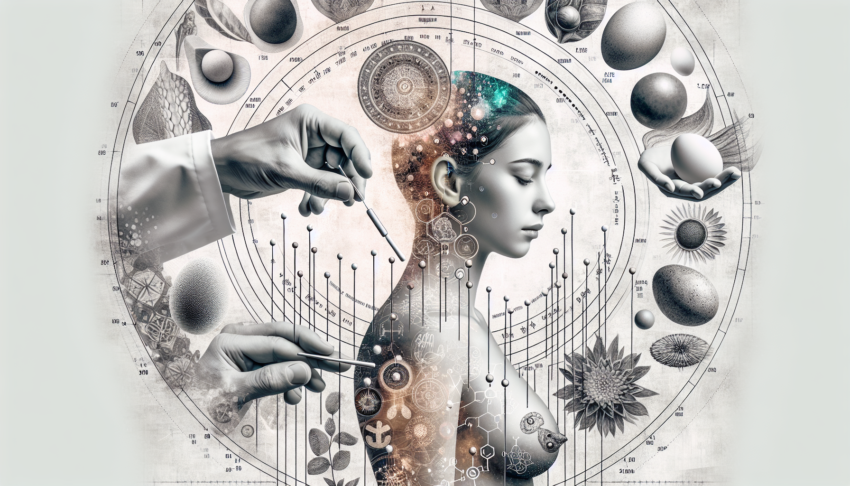Are you struggling to conceive and curious about alternative methods to assist you in your fertility journey? Look no further than acupuncture. This ancient practice, rooted in Traditional Chinese Medicine, has been gaining popularity among those trying to conceive. But just how effective is acupuncture when it comes to fertility? In this article, we will explore the potential benefits of acupuncture as a complementary treatment for those hoping to improve their chances of conceiving. So, sit back, relax, and discover if acupuncture could be the missing piece to your fertility puzzle.
What is Acupuncture?
Definition
Acupuncture is a traditional Chinese medicine technique that involves the insertion of thin needles into specific points on the body. It is based on the belief that the body has a vital energy called Qi (pronounced “chee”) that flows through pathways known as meridians. By stimulating these points, acupuncture is thought to promote the flow of Qi and restore the balance of energy in the body.
History of Acupuncture
Acupuncture has a long history dating back thousands of years in China. Its origins can be traced to ancient Chinese texts, such as The Yellow Emperor’s Classic of Internal Medicine, which is one of the earliest known medical texts. Acupuncture was traditionally used to treat a wide range of ailments and was incorporated into the broader practice of traditional Chinese medicine.
Principles of Acupuncture
Acupuncture is based on several principles, including the concept of Qi, Yin and Yang, and the Five Elements. Qi is the vital energy that flows through the body, and its balance is crucial for maintaining health. Yin and Yang represent opposing forces that need to be in balance for optimal well-being. The Five Elements (wood, fire, earth, metal, and water) are believed to correspond to different organs in the body and provide a framework for understanding and treating health issues.
Understanding Fertility
Definition of Fertility
Fertility refers to the ability to conceive and have a child. It is influenced by various factors, both physiological and environmental. For women, fertility is closely tied to the menstrual cycle and the release of a mature egg from the ovaries. In men, fertility is determined by the quantity and quality of sperm.
Factors Affecting Fertility
Numerous factors can affect fertility in both men and women. Age is a significant factor, as fertility declines in women starting in their late 20s and decreases more significantly after the age of 35. Other factors include hormonal imbalances, certain medical conditions, lifestyle choices such as smoking and excessive alcohol consumption, and environmental factors such as exposure to toxins or radiation.
Common Causes of Infertility
Infertility is defined as the inability to conceive after a year of unprotected intercourse. It can be caused by various factors, including ovulation disorders, fallopian tube blockage, endometriosis, uterine abnormalities, low sperm count or quality, and hormonal imbalances. Identifying the specific cause of infertility is crucial in determining the appropriate treatment approach.
The Role of Acupuncture in Fertility
Ancient Beliefs about Acupuncture and Fertility
In traditional Chinese medicine, fertility issues were believed to be a result of an imbalance in the body’s energy flow. Acupuncture, by stimulating specific points on the body, was thought to restore the balance of Qi and address the underlying issues contributing to infertility. It was believed to regulate the menstrual cycle, improve blood flow to the reproductive organs, and balance hormones.
Understanding the Modern Approach
While ancient beliefs about acupuncture and fertility provide a foundational understanding, modern scientific research has shed new light on the mechanisms by which acupuncture may influence fertility. It is now recognized that acupuncture can have a positive impact on various physiological processes involved in fertility, such as improving blood flow, reducing inflammation, and reducing stress.
Scientific Studies on Acupuncture and Fertility
Numerous studies have investigated the effectiveness of acupuncture in improving fertility outcomes. Some studies have shown positive results, suggesting that acupuncture can improve pregnancy rates in women undergoing in vitro fertilization (IVF) or other assisted reproductive technologies (ART). However, there is still some debate within the scientific community, as not all studies have shown significant effects. More research is needed to fully understand the role of acupuncture in fertility.
Benefits of Acupuncture for Fertility
Improved Blood Flow to the Reproductive Organs
Acupuncture has been found to improve blood flow to the reproductive organs, including the ovaries and uterus. This increased blood flow can enhance the delivery of important nutrients and oxygen to these organs, creating a more favorable environment for conception and implantation.
Balancing Hormones and Reducing Stress
Hormonal imbalances and stress can disrupt the reproductive system and interfere with fertility. Acupuncture has been shown to regulate hormones such as estrogen and progesterone, promoting a more balanced hormonal environment. Additionally, acupuncture can help reduce stress by stimulating the release of endorphins, which are natural pain-relieving and mood-boosting chemicals in the body.
Promoting Overall Well-being
Acupuncture is known to have a holistic effect on the body, not just targeting specific symptoms or conditions. By promoting overall well-being and restoring balance in the body, acupuncture can create a fertile ground for conception. This can include improving sleep quality, reducing fatigue, boosting the immune system, and enhancing emotional well-being.
Acupuncture Techniques for Fertility
Traditional Chinese Medicine Approach
In the traditional Chinese medicine approach to fertility, acupuncture is employed based on a thorough assessment of the individual’s overall health, including their constitution, pulse diagnosis, and tongue diagnosis. Acupuncture points are selected based on the specific imbalances detected, with the goal of restoring the flow of Qi and creating harmony within the body.
Electroacupuncture
Electroacupuncture is a modern technique that combines traditional acupuncture with electrical stimulation. It involves the use of a device that delivers a gentle electric current through the inserted needles. Electroacupuncture is thought to enhance the effects of traditional acupuncture by providing a stronger stimulus to the acupuncture points.
Auricular Acupuncture
Auricular acupuncture focuses on stimulating specific points on the ear that correspond to different parts of the body. This approach can be a useful adjunct to traditional acupuncture for fertility, as the ear is believed to have a direct connection to the reproductive system. It can be used as a stand-alone treatment or combined with other acupuncture techniques.
What to Expect During an Acupuncture Session
Initial Consultation and Assessment
During an initial consultation, the acupuncturist will gather detailed information about your medical history, lifestyle, and fertility concerns. They may also perform a physical examination and may ask questions about your menstrual cycle, any past fertility treatments, and any other relevant factors. This assessment helps the acupuncturist tailor the treatment to your specific needs.
Acupuncture Procedure
During an acupuncture session, you will typically lie comfortably on a treatment table. The acupuncturist will insert thin, sterile needles into specific acupuncture points on your body. The needles are typically left in place for around 20-30 minutes. The sensation experienced during the treatment is often described as a slight tingling or dull ache, but it is not usually painful.
Possible Sensations and Reactions
Everyone’s experience with acupuncture is unique, but some commonly reported sensations during treatment include a deep sense of relaxation, warmth, or a mild throbbing sensation. It is also possible to experience temporary bruising or slight bleeding at the needle site. Some people may feel energized after treatment, while others may feel more relaxed and sleepy.
Combining Acupuncture with Assisted Reproductive Technologies
Acupuncture as a Complementary Treatment
Many individuals undergoing assisted reproductive technologies, such as IVF, choose to incorporate acupuncture into their treatment plans as a complementary therapy. Acupuncture can help support and enhance the effects of these treatments by promoting relaxation, reducing stress, and improving overall well-being.
Effectiveness of Acupuncture in Conjunction with IVF
Some studies suggest that acupuncture may improve pregnancy rates in women undergoing IVF. It is believed that acupuncture can enhance the success of IVF by improving the quality of the uterine lining, promoting implantation, and reducing the side effects of fertility medications. However, more research is needed to establish the exact benefits and optimal timing of acupuncture in conjunction with IVF.
Timing and Frequency of Acupuncture Sessions
The timing and frequency of acupuncture sessions may vary depending on individual circumstances and treatment goals. In general, it is recommended to begin acupuncture a few months before starting assisted reproductive technologies to optimize the body’s readiness for pregnancy. Acupuncture sessions may be scheduled weekly or bi-weekly initially, with adjustments as needed throughout the treatment process.
Success Rates and Evidence
Conflicting Reports on Acupuncture’s Effectiveness
The effectiveness of acupuncture for fertility continues to be a topic of debate and discussion within the medical community. Some studies have shown positive outcomes, while others have found no significant effects. It is essential to consider individual factors and the specific context in which acupuncture is being utilized. The success of acupuncture for fertility may vary from person to person.
Key Studies and Findings
Several studies have explored the effects of acupuncture on fertility. A systematic review published in the journal Fertility and Sterility concluded that acupuncture may improve pregnancy rates in women undergoing IVF. Another study published in the British Medical Journal found that acupuncture may increase the chances of pregnancy in women undergoing IVF. However, further research is needed to confirm these findings and establish the optimal protocols for acupuncture in fertility treatment.
Patient Testimonials and Real-Life Experiences
Many individuals who have undergone acupuncture for fertility share positive testimonials and experiences. Some report improved menstrual regularity, increased feelings of relaxation and well-being, and successful pregnancies. While these personal stories provide insight into individual experiences, it is important to recognize that anecdotal evidence does not replace scientific research.
Risks and Safety Considerations
Minimal Risk of Complications
Acupuncture is generally considered safe when performed by a qualified acupuncturist. The risk of complications or side effects is minimal, especially when sterile needles are used. However, it is important to disclose any underlying medical conditions or medications to the acupuncturist to ensure safe and appropriate treatment.
Choosing a Qualified Acupuncturist
When seeking acupuncture for fertility, it is vital to choose a qualified acupuncturist who is experienced in treating fertility issues. Look for acupuncturists who are licensed and have specific training or specialization in reproductive health and fertility. Additionally, consider seeking referrals or recommendations from trusted healthcare professionals or friends who have had positive experiences.
Precautions for Certain Medical Conditions
While acupuncture is generally safe, there are some precautions to consider for individuals with certain medical conditions. Pregnant women should consult with their healthcare providers before undergoing acupuncture. Additionally, individuals with bleeding disorders, a history of seizures, or compromised immune systems should inform their acupuncturist and discuss any potential risks before treatment.
Conclusion
Summary of Acupuncture’s Potential for Fertility
Acupuncture holds promise as a complementary therapy for individuals experiencing fertility issues. It has been associated with benefits such as improved blood flow to the reproductive organs, hormone regulation, and overall well-being. While scientific evidence supporting its effectiveness is still evolving, many individuals have reported positive outcomes and experiences with acupuncture for fertility.
The Need for Individualized Care
It is crucial to recognize that fertility is a multifaceted and complex issue influenced by various factors. Acupuncture, as part of a holistic approach to fertility, should be tailored to each individual’s unique circumstances. Working with a qualified acupuncturist who takes the time to understand your specific needs and goals can help maximize the potential benefits of acupuncture in your fertility journey.



